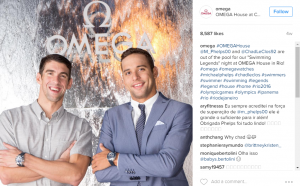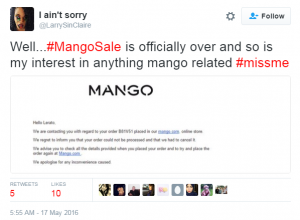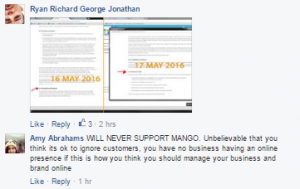Tag Archives: PR
The Sponsors Who Captured the Most Social Engagement during Rio 2016
With any major sporting event, we know that brands will fight not only to sponsor the world’s greatest athletes, but to push their international marketing efforts, especially using social and digital media. This year’s Olympic and Paralympic Games, hosted in Brazil’s Rio de Janeiro, were no different as sponsors jostled to capture the most social engagement.
The Rio Olympics received official sponsorships from the world’s biggest brands – Samsung, Coca-Cola, McDonald’s – giving us a front row seat to watch innovative marketing campaigns unfold, and causing this year’s Game’s to be declared the most social ever. Ratings on traditional media channels, such as TV, continue to drop; thus social media was the perfect platform to connect with fans and athletes alike. Platforms used included Facebook, Twitter, Instagram and Snapchat, which helped the brands solidify their presence and reach with round-the-clock coverage, while talking to their customers directly where they are.
“That includes behind-the-scenes access, Facebook Live interviews, social media takeovers by athletes, real-time score updates, tune-in streaming info, social polls, articles, videos and photo galleries from NBCOlympics.com.”- adweek.com
While Facebook was the main social platform used to share official content, Instagram came out on top when it came to engagement.
Samsung’s #DoWhatYouCant campaign mini-series “highlights personal battles of sacrifice, illness and never giving up”. However, what landed them on the top spot is their ‘connections without borders’ mantra that showcased their Galaxy S7 Edge. They achieved global interest and recognition through emotive and motivational ads, namely “The Chant” and “The Anthem”. The Chant features South Sudan’s first ever Olympic team member, athlete Margret Rumat Rumat Hassan. The Anthem combines the world’s national anthems into one song, showing how we only have geographical barriers that can be broken if we unify and connect.
Timepiece brand Omega won overall engagement on Instagram with their hashtag #recordingdreams, a ‘movement’ supported by brand ambassadors Michael Phelps, Chad Le Clos, Jessica Ennis-Hill and Sergio Garcia. They achieved this through rich imagery, influencer marketing, and relevant and timely content, although Samsung had the most engaging posts on Instagram.
However, some brands that weren’t official sponsors still managed to break through: National Lottery sponsored Team Great Britain, who boasted a record-breaking result as they won more medals this year than the Olympics they hosted. @TeamGB saw over 100 000 new followers and players’ paid tribute to the continued support and sponsorship from the brand that afforded the athletes the opportunity to train, compete and excel.
Under Armour, an American sports clothing and accessories company, got everyone talking as USA’s gymnastics team and new star of Team USA Simone Biles performed their routines in their apparel; while the Michael Phelps video that was part of the Rule Yourself campaign created a social stir.
One thing that is clear is that brands need to capitalise on social media and new digital streams in order to make an impact, whether they are sponsors or not. And just for good measure, although not on our list, we have to share this brilliant Nike ad that features our golden girl Caster Semenya, who came home with a gold medal for her world-class performance in the women’s 1 500m race.
Tiisetso Gama, Internal Communications Manager
Lessons from the #MangoSale: Always engage, especially in a crisis
There are many different factors that influence a customers purchasing decision to buy from you and not your competitor. They can be linked to your advertising or marketing campaigns or the credibility of your products and services; amongst other things. Word of mouth carries a lot more weight than other forms of marketing, which is why online influencers and ambassadors are on the rise thanks to social media. A brand’s reputation is at the centre of business success, and a high price isn’t a deterrent to many consumers, as long as the brand enjoys a good reputation.
With that said, consumers love a good bargain, which was seemingly the case when international fashion retailer Mango posted a #MangoSale on May 16th, sighting as much as 300% off certain items, with some going for as little as R1. Anyone would assume this must have been a glitch on the website, however the sale was still up after a few hours, giving consumers enough time to save hundreds of rands on designer items that would have cost a pretty penny at their original price.
Once the error had been identified, Mango’s team then opted to email consumers who had taken part in the sale, alerting them to the fact that their orders would be cancelled and their monies refunded. No press release. No apology. Just a simple email, which had many customers citing the consumer protection act and threatening to amplify their frustrations on social media and through reputable news sites. “During a crisis, user-generated content and the subsequent online reputation of a brand is put under the spotlight” – Vincent Magwenya. Furthermore, Mango quickly amended the terms and conditions on their website, which didn’t go unnoticed.
This is where good crisis communication is key to maintaining a positive reputation.
Consumers know the rules of engagement and want you to engage & keep them informed.. If you don’t, they will call you on it. Every brand has to handle issues or crises, it is how you handle them that the consumers will remember, and that is what will ultimately affect your bottom line.
A thoughtful reply, even without having to admit fault, shows that one cares about their customers, wants to retain their loyalty and is serious about mending the trust that has been broken. Having a crisis management plan and team in place is crucial to avoiding unnecessary backlash and damage to the brand, as well as managing customers and stakeholders’ relations. We all know that failure to plan is planning to fail; therefore how you rise up from your errors ensures that you enjoy a positive reputation that lives well beyond the crisis.
Tiisetso Gama, Internal Communications Manager



